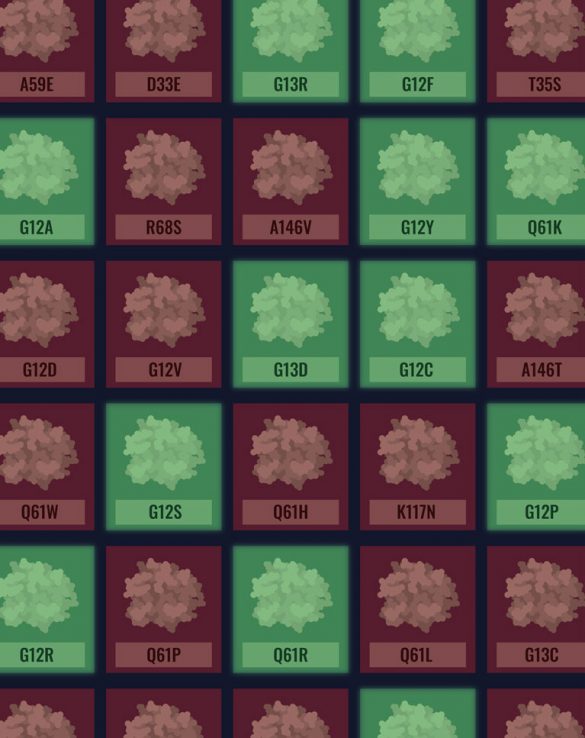 |
| RAS Mutations in green were found to be immunotherapy sensitive |
Colorectal patients with certain cancer promoting mutations currently are not offered targeted immunotherapy because their tumors have mutations thought to cause resistance to such drugs.
New research however at the Salk Institute, led by Edward Stites, MD, challenges the blanket contraindication for these patients. The study was published Dec. 14, 2021 in the journal Cell Reports.
“Our study suggests that one already available targeted therapy could benefit up to 12,000 additional colon cancer patients every year,” Stites said in a press release. “Our findings are pre-clinical, and we hope this research will motivate clinicians to develop clinical trials that further examine our results.”
Colorectal cancer patients had previously gain substantial benefit from immunotherapy drugs that target a specific protein called epidermal growth factor receptor or EGFR, which is known to drive the growth of certain cancers.
The first such immunotherapy drug approved by the FDA in 2004 was cetuximab (Erbitux®), however because it had been found ineffective in patients whose tumors also had a mutation known as RAS, such patients were not offered the drug because their tumors would not respond.
Using computer modeling, Thomas McFall, a post doctoral researcher on Stites’ team and the study’s first author, who is now at the Medical College of Wisconsin, found that not all RAS mutations are equal. In all, the researchers found 10 distinct RAS mutations that would still allow tumors to respond to immunotherapy. The team then confirmed their modeling findings in the lab.
Since 2004, several more immunotherapy drugs have been FDA approved for colorectal cancer, and now may prove effective in patients who had previously been excluded from such treatments. These patients may now be offered these treatments "off label," meaning without specific FDA approval ahead of clinical trials to confirm the laboratory results.
Sources: Salk Institute press release
“Our study suggests that one already available targeted therapy could benefit up to 12,000 additional colon cancer patients every year,” Stites said in a press release. “Our findings are pre-clinical, and we hope this research will motivate clinicians to develop clinical trials that further examine our results.”
Colorectal cancer patients had previously gain substantial benefit from immunotherapy drugs that target a specific protein called epidermal growth factor receptor or EGFR, which is known to drive the growth of certain cancers.
The first such immunotherapy drug approved by the FDA in 2004 was cetuximab (Erbitux®), however because it had been found ineffective in patients whose tumors also had a mutation known as RAS, such patients were not offered the drug because their tumors would not respond.
Using computer modeling, Thomas McFall, a post doctoral researcher on Stites’ team and the study’s first author, who is now at the Medical College of Wisconsin, found that not all RAS mutations are equal. In all, the researchers found 10 distinct RAS mutations that would still allow tumors to respond to immunotherapy. The team then confirmed their modeling findings in the lab.
Since 2004, several more immunotherapy drugs have been FDA approved for colorectal cancer, and now may prove effective in patients who had previously been excluded from such treatments. These patients may now be offered these treatments "off label," meaning without specific FDA approval ahead of clinical trials to confirm the laboratory results.
Sources: Salk Institute press release


No comments:
Post a Comment